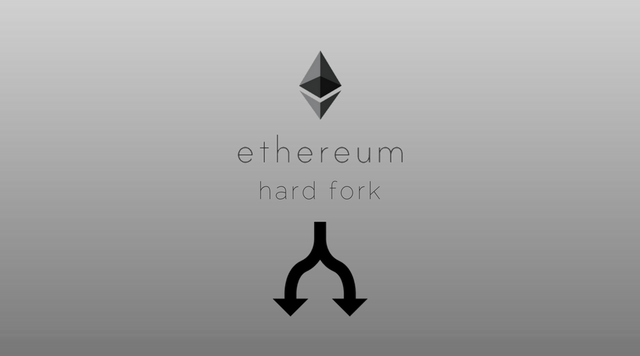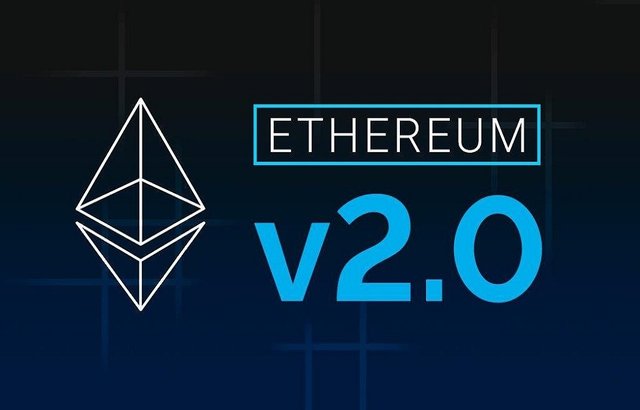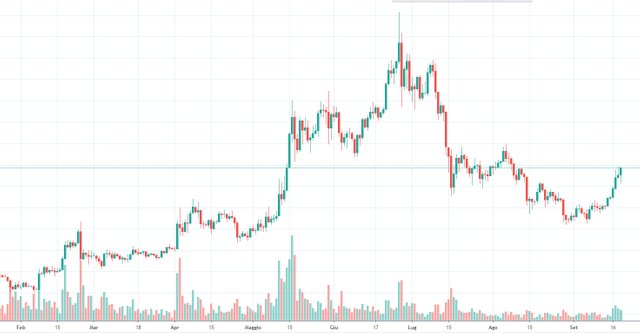Ethereum HARD FORK Istanbul [ITA-ENG]
Ben trovati a tutti, oggi si parla di un argomento ancora scottante, l’hard fork di ethereum di cui tanto si parla, che cos'è esattamente? che migliorie comporta alla blockchain ethereum? la renderà più scalabile? la renderà più efficiente? che impatto avrà sul prezzo? e soprattutto sdoppierà effettivamente le blockchain? …. il fork avverrà tra molto poco, un mese circa, a meno che ci siano ulteriori rimandi come già è accaduto.

Basta con le chiacchiere e andiamo a vedere questo famigerato hard fork chiamato Istanbul (nome in codice) ed era prevista in origine per il mese di settembre poi per alcuni inconvenienti ovvero possibili incompatibilità, nonché la necessità di prolungare leggermente la permanenza sulla testNet, hanno deciso di posticiparla, sinceramente io apprezzo di più un approccio di questo tipo, più conservativo, con il rischio di deludere gli spettatori però nello sviluppo spesso e volentieri è così, chi ci lavora sicuramente lo sa, si evita di fare aggiornamenti e poi trovare in seguito dei bug e dopo è molto più grave perché una volta che è in produzione può diventare davvero difficile gestire dei potenziali bug, stiamo parlando di blockchain che hanno l'onere di gestire il valore, quindi un bug è veramente una cosa disastrosa per il sistema stesso.
La data precisa è mercoledì 16 ottobre 2019 “projected date”, ma come detto una data fittizia, quindi è necessario un po' di rodaggio sulla testNet, a meno di nuovi problemi rilevanti, questo avverrà circa un mese dopo sulla mainNet.
Istanbul in realtà è diviso in due parti, una parte è quella che avverrà a ottobre che introduce sei EIPs, acronimo di Ethiruum improvment Proposal, e una seconda parte che ancora non ha una data che introdurrà altri EIPs che sono “Tentatively Accepted” attualmente accettati, ma solo in parte, quindi bisogna ancora fare degli Audit e verificare alcune cose e pertanto verranno implementati in una seconda istanza di Istanbul che verrà chiamata Berlin.
Prima di continuare voglio dare risposta alla domanda più frequente “Quindi si scinderanno le blockchain ethereum con due diversi livelli di “aggiornamento” come tra ethereum ed ethereum classic”? Prima di tutto ethereum sta aggiornando il suo protocollo “network upgrade” proprio perché si cerca di creare una versione sempre più efficiente della Ethereum Virtual machine e di tutto l'ecosistema che ci gira intorno, pertanto questi fork non creano due fazioni contrarie una che vuole rimanere con i vecchi algoritmi e una che accetta l'aggiornamento perché quanto appena affermato comporta la creazione di due Chain rivali e le Community che ci stanno dietro, da ricordare che una blockchain non rimane in piedi da sola, ma ha un costo pazzesco per tenerla in piedi dove vediamo i miners che continuino a creare blocchi, serve che quei blocchi siano riempiti di transazioni, quindi che la blockchain venga utilizzata altrimenti perde il senso di esistere, e pertanto serve a un mercato per la Coin stessa altrimenti non c’è valore. Questo non è il caso descritto perché non ci sono interessi politici di nessun tipo, non ci sono interessi economici particolari, ma c'è solo l'interesse di cercare di migliorare sotto vari aspetti la blockchain ethereum, quello che c’è da aspettarsi e che ci sia un'unica blockchain che verrà accettata da tutti, pertanto attenzione a chi dice che ci sia lo sdoppiamento delle coin o magari gratis probabilmente vi vuole scammare che quando ci sono i forks gli scammer sono sempre dietro l'angolo.
Veniamo adesso agli EIPs, fondamentalmente sono tre gli aspetti che vengono migliorati, Il primo è una cost-efficiency si rilancia un po' il costo del gas per diverse funzioni e diversi utilizzi, quindi per l'utilizzo di memoria, questo non fa grossi passi avanti verso la scalabilità che il problema principale di etherium però c'è tutto un piano più a lungo termine, seconda cosa l'integrazione con ZCash, che in realtà sulla rete ethereum, le transazioni Zk snarks erano già state abilitate precedentemente per migliorare la privacy delle transazioni stesse, in questo caso grazie alla possibilità di verificare il proof-of-work equihash dentro uno Smart Contract ethereum riuscirà ad avere un'integrazione di livello superiore con addirittura gli Atomic swaps. le Zk snarks sono state ottimizzate dal punto di vista del costo e gli EIP-2028 aggiunge un ulteriore ottimizzazione soprattutto per le applicazioni layer two degli strati ulteriori e ottimizzano il costo di quell'operazione.
Riguardo al *layer two è stato introdotto EIP-1344 che ottimizza anche questo l'utilizzo di applicazioni di secondo livello (state channels, plasma) ed è utile nel caso di Forks per tracciare la chain corretta aggiungendo un identificativo della Chain da un altro layer superi.
Questi sono gli aggiornamenti che avverranno in Istanbul e visto che abbiamo parlato di scalabilità di ethereum avrà teoricamente un miglioramento con l'implementazione del famoso ethereum 2.0 chiamato Serenity che è previsto per una data da destinarsi.

Tuttavia se andiamo a vedere gli EIPs previsti per “Berlin”, ossia la fase 2 di Istanbul, ne vediamo uno particolarmente interessante ovvero EIP-1057 che introduce l’algoritmo di consenso progPOW ovvero Programmatic proof-of-work, questo vuole essere una transizione per la decentralizzazione ovviamente non si può passare da proof-of-work a proof-of-stake con uno schiocco di dita, ma sarà un procedimento che avviene a Step, questo è un primo step e cerca di eliminare la grande influenza che i chip asic hanno attualmente sulla rete che la centralizza, questo nuovo algoritmo cerca di dare una maggiore efficienza al mining tramite GPU rimettendo in gioco anche i piccoli players perché chiaramente il mining con asic è riservato quasi ai business perché ovviamente ha dei costi elevati e anche il suo mantenimento non è facile, invece il mining via GPU è più destinato all'utente finale, chiaramente anche lì c'è tutto un discorso sul costo, sui mining rig di gpu ecc… però non c'è paragone rispetto agli Asics e ai Farm che si possono fare con gli Asics stesso, quindi è un piccolo step verso la decentralizzazione che comunque è l'obiettivo finale assieme alla scalabilità di ethereum, ma nonostante questo è comunque il network molto promettente anche come qualità delle persone che ci lavorano dietro nonché delle Depps costruite su di esso, anche se adesso sta attraversando un periodo un po' difficile perché la sua blockchain è satura, ma è solo un periodo difficile che anche Bitcoin ha avuto anni fa, il periodo di sfiducia però se il lavoro Continua con la stessa qualità con cui ha sempre fatto sono sicuro che verrà superato alla grande.

Voi che ne pensate di etherium? lo seguite? come vi sembra il suo sviluppo? dite la vostra!!!!
Ciao a tutti
Greetings all, today we talk about a topic that is still hot, the ** hard fork ** of ethereum that we talk about so much, what exactly is it? what improvements related to the blockchain ethereum? will make it more scalable? will make it more efficient? what impact will it have on the price? and above all will it double the blockchains? .... the fork will happen in a very short time, about a month, unless there are further references as has already happened.

Enough of the talk and we go to see this infamous hard fork called ** Istanbul ** (codename) and was originally planned for the month of September then for some inconveniences or possible incompatibilities, as well as the need to slightly extend the stay on testNet, have decided to postpone it, honestly I appreciate more a more conservative approach of this kind, with the risk of disappointing then finding bugs later and after it is much more serious because once it is in production it can become really difficult to manage bug problems, we're talking about blockchains that have the burden of managing value, so a bug is really a disastrous thing for the system itself.
The exact date is Wednesday, October 16, 2019 "scheduled date", but as said a fictitious date, so a bit of testing on the testNet is needed, unless there are significant new problems, this will happen about a month later on the mainNet.
Istanbul is actually divided into ** two parts **, a part that will take place in October which introduce six EIP, an acronym for ** Ethiruum Improvment Proposte **, and a second part that does not yet have data presenting other EIPs that they are ** "Accepted provisionally" ** currently accepted, but only in part, so you still need to do audits and check some things and eventually implemented in a second instance of Istanbul that will be called Berlin.
Before continuing I want to answer the most frequent question "So the blockchain ethereum will be split with two different levels of" update "as between ethereum and ethereum classic"? First of all, ethereum is updating its "network upgrade" protocol precisely because it tries to create an ever more efficient version of the ** Ethereum Virtual machine ** and all the ecosystem that revolves around it, so these forks do not create two factions against one that wants to stay with the old algorithms and one that accepts the update because what has just been said involves the creation of two rival Chain and the Communities behind it, to remember that a blockchain does not remain standing alone, but has a crazy cost to keep it standing where we see the miners continuing to create blocks, it is necessary that those blocks are filled with transactions, so that the blockchain is used otherwise it loses the sense of existing, and therefore serves a market for the Coin itself otherwise not there is value. This is not the case described because there are no political interests of any kind, there are no particular economic interests, but there is only the interest of trying to improve the blockchain ethereum in various ways, what is to be expected and that there is only one blockchain that will be accepted by all, so be careful of those who say that there is a splitting of the coins or maybe free you will probably want to ** scammare ** that when there are forks the scammers are always around the corner .
Now we come to the EIPs, basically there are ** three aspects that are improved **, the first is a ** cost-efficiency ** the cost of gas is raised a little for different functions and different uses, so for use of memory, this does not make big steps towards the scalability that the main problem of etherium, however, there is a whole more long-term plan, second thing ** the integration with ZCash **, which in reality on the network ethereum, the Zk snarks transactions had already been previously enabled to improve the privacy of the transactions themselves, in this case thanks to the possibility of verifying the equihash proof-of-work inside a Smart Contract ethereum will manage to have a higher level integration with even the Atomic swaps . the Zk snarks have been optimized from the point of view of cost and the ** EIP-2028 ** adds further optimization especially for the layer two applications of the further layers and optimize the cost of that operation.
Regarding ** layer two * ** EIP-1344 ** has been introduced which also optimizes the use of second level applications (state channels, plasma) and is useful in the case of Forks to trace the correct chain by adding an identifier of the Chain from another layer exceeds.
These are the updates that will take place in Istanbul and since we talked about the scalability of ethereum it will theoretically have an improvement with the implementation of the famous ** ethereum 2.0 called Serenity ** which is scheduled for a date to be decided.

However, if we look at the EIPs envisaged for "** Berlin **", ie phase 2 of Istanbul, we see one that is particularly interesting, namely ** EIP-1057 ** which introduces the progPOW consensus algorithm, ie ** Programmatic proof -of-work **, this wants to be a transition for decentralization obviously you can't switch from proof-of-work to proof-of-stake with a snap of your fingers, but it will be a process that takes place in Step, this is a first step and try to eliminate the great influence that the asic chips currently have on the network that centralizes it, this new algorithm tries to give a higher efficiency to the GPU mining by putting even the small players back into play because clearly the asic mining is almost reserved to the business because obviously it has high costs and also its maintenance is not easy, instead mining via GPU is more intended for the end user, clearly there is also a whole discussion on the cost, on the mining rig of gpu ec c ... but there is no comparison with the Asics and the Farms that can be done with the Asics itself, so it is a small step towards decentralization which, however, is the ultimate goal together with the scalability of ethereum, but despite this it is still the very promising network also as a quality of the people who work behind it as well as of the Depps built on it, even if now it is going through a difficult period because its blockchain is saturated, but it is only a difficult period that Bitcoin has also had years ago, the period of distrust though if the work continues with the same quality with which it has always done I am sure that it will be exceeded great.

What do you think about etherium? do you follow him? how does its development seem to you? have your say !!!!
Regards